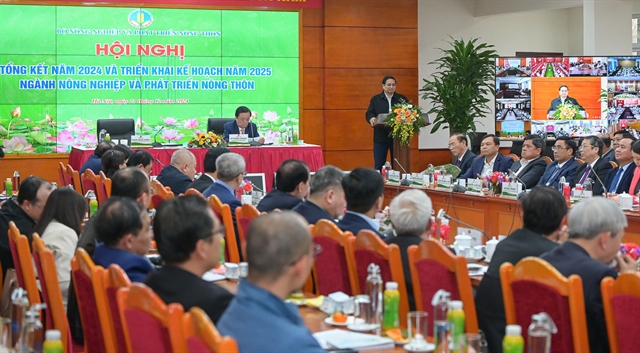Agriculture sector urged to accelerate, make breakthroughs in 2025: PM_xếp hạng cúp c1
Agriculture sector urged to accelerate,xếp hạng cúp c1 make breakthroughs in 2025: PM
December 27, 2024 - 20:13 |
| Prime Minister Phạm Minh Chính speaks at the conference. VNA/VNS Photo |
HÀ NỘI — Prime Minister Phạm Minh Chính on Friday urged the agricultural sector to accelerate reforms and embrace innovation, emphasising the need to ensure greater prosperity for farmers, modernised rural areas, and advanced agricultural practices as Việt Nam enters a new era of national growth.
Speaking at the 2024 annual review and 2025 planning conference for the Ministry of Agriculture and Rural Development (MARD), he called on the sector to join the country in embarking on "an era of national rise."
The hybrid conference, held at the MARD headquarters in Hà Nội and connected to 63 provinces and cities, gathered key participants, including Minister of Agriculture and Rural Development Lê Minh Hoan, Minister of Culture, Sports and Tourism Nguyễn Văn Hùng, central and local officials, research institutions, industry associations, and prominent enterprises and cooperatives.
Breaking records in agricultural exports
Despite a challenging year in 2024, marked by market fluctuations, extreme weather, and the devastating impacts of Typhoon Yagi in the northern provinces, the agricultural sector achieved remarkable milestones. Under the consistent leadership of the Party, National Assembly, and Government, the sector maintained national food security, set new export records, and solidified its role as a cornerstone of the national economy.
The sector achieved 3.3 per cent growth in production value, with forest coverage reaching 42.02 per cent and 78.7 per cent of communes meeting new rural development standards. Access to clean water in rural areas rose to 58 per cent. Total agricultural, forestry, and fishery exports reached a historic US$62.5 billion, an 18.7 per cent increase from 2023, while the trade surplus soared to a record US$17.9 billion, up 46.8 per cent. Seven product categories exceeded US$3 billion in export value, led by wood products (US$16.2 billion), fruit and vegetables (US$7.12 billion), and rice (US$5.75 billion).
Structural transformation in agriculture continued, aligning production with market demands and prioritising high-value, competitive products. Initiatives promoting green and sustainable agricultural practices gained traction, including the "one million hectares of high-quality rice cultivation" programme.
For 2025, the sector aims for GDP growth of 3.3–3.4 per cent, export turnover of US$64–65 billion, and 80 per cent of communes meeting new rural standards. Forest coverage will remain at 42.02 per cent, with access to clean water in rural areas increasing to 60 per cent.
Accelerating agricultural diplomacy and innovation
The Prime Minister highlighted agriculture's critical role in disaster response, food security, and its contributions to trade balance but also acknowledged persistent challenges, such as untapped agricultural potential, outdated policies, and limitations in processing and branding.
He emphasised the need for rapid, sustainable development leveraging Việt Nam’s agricultural strengths and innovative potential. Lessons from 2024 underscored the importance of decisive leadership, inter-sectoral coordination, and swift adaptation to market dynamics. In 2025, the sector must focus on green growth, digital transformation, and circular and knowledge-based economies to address climate change effectively.
To foster growth, governance structures will be streamlined, and stronger decentralisation will empower local authorities. Simplified administrative procedures, coupled with strategic investment in processing, market expansion, and integrated rural development, are critical priorities.
Agriculture will be restructured around three main product groups, with initiatives like the "One Commune, One Product" (OCOP) programme and the expansion of the "1 million hectares of high-quality rice" project in the Mekong Delta. Small-scale farming will transition towards high-tech, sustainable models, bolstered by enhanced collaboration among farmers, the State, enterprises, scientists, and banks.
The Prime Minister also stressed the importance of branding Vietnamese agricultural products and diversifying supply chains. Leveraging trade agreements like the EVFTA and CPTPP will open new markets and reduce reliance on a few key partners.
Marine and forestry economies are also priorities, with a focus on addressing the EU "yellow card" for fisheries, developing infrastructure, and exploring carbon credit opportunities linked to forests. Rural development programmes will prioritise disaster preparedness, improving housing, and preserving cultural identities.
The Prime Minister reaffirmed the sector’s pivotal role in Việt Nam’s broader national development, expressing confidence in its ability to become modern, sustainable, and globally competitive. He envisioned rural areas becoming increasingly prosperous and farmers enjoying greater well-being.
Concluding the address, he reiterated the Government’s unwavering support for the agricultural sector, describing it as central to Việt Nam’s journey towards a resilient and prosperous future. VNS
本文地址:http://vip.rgbet01.com/html/641c998722.html
版权声明
本文仅代表作者观点,不代表本站立场。
本文系作者授权发表,未经许可,不得转载。